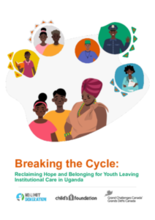Tiegan Boyens, ATD Fourth World and Teen Advocacy
To commemorate their 10th anniversary as an Alliance, this year’s Symposium took place on October 26, 2023, and offered a retrospective view of the Cape Town conference and the impact it achieved, both in the participating countries and globally. Then, through a deep dive into the experiences of three other countries— Romania, Rwanda and Viet Nam—it will explore the different ways countries have made progress in strengthening their workforce over the past decade and will highlight the continuing and emerging challenges facing the workforce in each country.
This webinar aimed to show care reform advocates can use budget analysis, cost estimates and evidence on long-term economic benefits to make the case for investing in a more a child-centered social welfare system.
Tiegan Boyens, of ATD Fourth World and Teen Advocacy, shares about the importance of staying connected to birth family as an adoptee as well as maintaining other connections such as friendships made throughout childhood.
In this webinar, a new paper on strategies to prevent family separation is presented. Examples from Rwanda, Kenya, Uganda and Namibia are presented.
The objective of this webinar was to present the best practices learnt in the implementation of the youth wellbeing project which focused on integrated mental health and wellbeing support for youth and particularly young people with lived experience of care.
On 21st September 2023, the Governments of Canada and Zambia, in partnership with UNFPA-UNICEF Global Programme to End Child Marriage and the Child Marriage Monitoring Mechanism, hosted a High-Level Side Event during the Seventy-Eighth Session of the United Nations General Assembly. The event was titled 'Charting Brighter Futures: Utilizing Data for Accelerated Action to End Child Marriage and Achieve SDG 5.3'.
The origin story of the Catholic Church in the United States includes a dependency on slave labor and sales to sustain itself and build its institutions.
The government of Kenya has been working with UNICEF, Changing the Way We Care, Charitable Children's Institutions and local CSOs to pilot care reform at the county level. Learning from these demonstration counties is being used to shape care reform in other counties and at the national level. This video explores care reform in one demonstration county, Kisumu.
This UNICEF ESARO webinar explores the role of case management in care reform and examines strategies for effective case management from Kenya, Ghana and Uganda. Speakers address case conferencing, integrated case management, caseloads, and monitoring case management.

